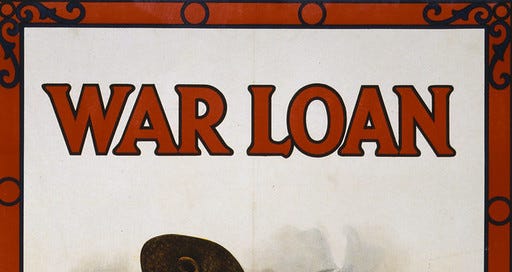Rob’s comments below are in italics.
Derek’s comments below are in normal font.
We're talking about warfare today, which is definitely a relevant topic, given worldly goings on and the connection to the financial system. So what do we need to know?
We had the so-called 12 days of what you could call it, Israel and Iran, terminated by a ceasefire that Donald Trump is taking credit for. It's worth examining the broader implications of this. Before we get back to that, I wanted to review the nature of warfare, as this has been a phenomenon that has been ongoing for approximately 6,000 years.
In the ancient world, it was a straightforward case of basically robbery with violence on a grand scale. That's what it remains. In the ancient world, there were essentially two forms of wealth. One was land, productive agricultural land, and the other was a means of labouring on the land.
Rulers would initiate warfare to grab more land from their neighbours and to grab more men and women that they could turn into slaves. Obviously, there's always a cost of warfare that has to be borne before you reap the dividend from it.
Throughout history, they've either financed it by building up a war chest beforehand or hoping to obtain enough plunder as they go about it to finance it, or in some cases, by borrowing it. There have been moneylenders prepared to lend to kings to finance warfare. Sometimes, that has been a very unsatisfactory bargain from their point of view. Probably one of the most prominent cases in history is the Knights Templar who loaned money to King Philip of France to finance his crusades.
He decided that he either couldn't pay it back or didn't want to. Therefore, he accused the Knights Templars of heresy and had them burned at the stake.
Yeah, I was thinking of Edward the First, who raised money from the Italians for some of his crusades.
This is topical because we had the NATO summit meeting yesterday. All of our European governments duly fell into line and promised to spend 5% of GDP on so-called defence. Considering that we're spending two and a half percent and struggling to get that up to 2.6. How we're going to reach 5% without even deeper cuts in the things that taxpayers of this country want the government to be doing for them is something we just have to see.
Meanwhile, the warlike rhetoric is going up. We're told every day that we're under threat from the Russians. One of the conclusions that NATO came to is that they want to create a minefield all down the edge of the Russian border. Why they imagine that Russia is likely to trample across Europe, I can't imagine. There's not much sign of it.
We won't delve into the pros and cons of the war in Ukraine or its origins here, but it doesn't seem to be going very well at all for Ukraine. Zelensky attended the NATO meeting but wasn't allowed to participate in it. He had a very short meeting with Donald Trump, apparently offering to pay for more weapons from America. Whether that goes anywhere or not, we'll have to wait and see. As far as I understand, his government is bankrupt. It's unable to pay the war pensions for its deceased soldiers and is unable to service its debts. So where the money is going to come from to buy more weapons, we don't know.
Of course, we've had the dramatic attacks on Iran by Israel. This is a breach of international law by any standards. They sustained far more damage in return than they had ever expected. We don't know the full extent of that because it's been heavily censored.
The justification for this attack was alleged to be to prevent Iran from developing nuclear weapons, although there was no evidence that it was doing so. It has now reduced its level of cooperation with the International Atomic Energy Authority, which had been monitoring it. Not surprisingly, seeing as that authority clearly provided Israel with the intelligence it needed to know exactly where to target the nuclear facilities. Furthermore, the somewhat ambiguous report that they just put in was what provided the nominal excuse for the attack.
Bear in mind that whether Israel carried out the initial attack or not, this is a client state of the United States. However, there seems to be a lot of debate at the moment about whether the United States is in thrall to Israel or Israel's thrall to the United States. The US has had an attack on Iran as part of its agenda for at least the past 20 years. Currently, you need to view this within the context of the BRICS Alliance, which is gaining strength and credibility as an alternative to the American-dominated World Financial System. It's valid to examine all the other wars America has been involved in as part of its efforts to maintain its hegemony over the global financial system.
Yeah, it's never really about weapons of mass destruction or preventing some state from having nuclear weapons or whatever excuse they give. It's about geopolitical hegemony and control.
Iraq had been seriously considering accepting payments for its oil in euros rather than dollars. Some people regarded that as the real reason for the invasion of Iraq, the two invasions of Iraq. Gaddafi had been discussing the establishment of a Pan-African gold-based currency and offering to accept it as payment for Libya's oil.
I was listening to an interesting discussion this morning about the Yugoslav war in the early 90s. The story in the Western press was that Milosevic was a ruthless dictator. We had to attack Serbia to prevent its humanitarian purges against the other parts of Yugoslavia. In fact, when Yugoslavia broke up after the dissolution of the Soviet Union in 1991, the various fragments of it except Serbia, all adopted Western-oriented governments. Serbia was the only one that elected a communist government, which was a significant part of the motivation for the NATO intervention.
From a humanitarian point of view, it didn't improve the fortunes of any people who were subject to Serbian oppression because there were an extra 10,000 non-Serbian ethnics who were massacred after the bombing started. It's also interesting that this was the point at which Europeans wanted to resolve the difficulties in the former Yugoslavia through negotiation. Rather than doing so peacefully through the European Union, which was originally established to prevent war in Europe. It was taken over by NATO which resolved it with a bombing campaign. This shift significantly altered the approach from one of peacemaking to one of resolution by violence.
It’s one of the great inversions, isn't there, where all of these things get cached as a defence fund or a defence force. It's not defence when you're going and picking a fight, is it?
Exactly. One of the things that I would have thought was the lesson from what we've seen in Ukraine is that the whole project of warfare has become self-defeating insofar as you pour all this money into advanced war-making machinery of one sort or another, whether it's fighters, bombers, tanks, personnel carriers and the rest of it. These are destroyed at a far faster rate than they can be produced.
Another significant aspect of the picture is that we must consider the costs in terms of materials and energy, which involve colossal amounts of energy in the manufacture of high explosives, as well as in the delivery mechanisms for those explosives, whether it's shells, missiles, or bombs. This is an ultimately finite resource that is being taken away from activities that produce genuine benefits.
I wonder how much silver is required to produce a fighter jet.
Yeah exactly so. What's your reaction to what we've said so far?
There's a significant difference between the narrative of what they're saying and the actions that actually occur. I come back to what Caitlin Johnson says about keeping a close eye on the movements of both military hardware and troops around the world. That gives you a much better idea of what's going on.
This relates to what I was saying about the systems established at the end of the Second World War during the Bretton Woods Conference. America had been essentially undamaged by the war itself. Lost 150,000 troops compared with the 27 million that had been lost by Russia, civilians and troops in that war, and the absolute devastation right across Europe and the destruction. America then demanded repayment of the loans it had made to the Allies during the war, which further crippled the European economies. They then generously had the Marshall Plan, which was provided to the Europeans to spend with American manufacturers re-equipping and rebuilding themselves.
Seems to be a great financial incentive for war, not against war. Some of the perhaps worst people in the world stand to benefit greatly by more war happening, not less.
This system that America established after the Second World War was one in which the dollar was tightly linked to gold. Of course, that was terminated by Richard Nixon in 1972, when largely as a result of the Vietnam War, money was being spent overseas. Particularly Charles de Gaulle wanted to send the dollars back to the United States and cash them in for gold. So they suspended that convertibility.
Since then, America has been able to spend as freely as it wished all over the world. The recipients were expected to hold the dollars and reinvest them in the United States, either in the form of treasury bonds or perhaps commercial bonds or stocks and shares, but without achieving a controlling stake in any American enterprises. Now, over the last decade, it has become increasingly clear to the rest of the world that this is not a good idea, that the dollar is not going to maintain its value. They're not going to play.
That brings us back full circle to the attempts to coerce the rest of the world to fall into line by military means. This could become self-defeating very much more rapidly than anyone would realise.
It feels to me like they're trying to kick the can down the road even further, and there isn't any more road.
That is increasingly looking like it. I'm not sure how willingly the Russians, Chinese and Iranians have been investing in the weaponry and military equipment that they've built up, which has obviously been enormous and has completely shifted the balance. It's astonishing the sophistication of these weapons have been produced internally by countries that we hadn't thought of as being technologically sophisticated or advanced.
But they've realised that as a matter of realism, they have to be in a position to defend themselves forcefully. It's certainly going to be a very interesting year and a very frustrating time for all of us as we watch our standards of living decline in the pursuit of trying to catch up and match this. Across Europe, I can't imagine that the population can be at all looking forward to larger amounts of their taxation going on something which is certainly not contributing to our well-being. Arguably, it makes the world more dangerous rather than safer.
Most people just don't understand what level taxation really sits at, and then also how it's used. It's clear that if they want to invest money on roads or something, they just get the magic money machine spinning and creating more money for it. They don't need to tax for this, it's just to make everyone poor.
But yeah, if everyone understood that taxation was really at 90% when you look at it, spend it, you tax them on what you earn, and you tax them on what you spend. It's not going to be the things that they tell us it's going on, like emptying the bins, fixing the roads and all of the things that we want to pay taxes for. Income tax was only introduced in the Napoleonic Wars as a temporary measure. So, but yeah, it strikes me that taxation could be more like 10% to cover the things that we all agree are beneficial to be done centrally.
Yeah, that's right. Quite so. Exactly so. Right, that's about it for today.















Share this post